Global value chain crucial to overcoming trade troubles
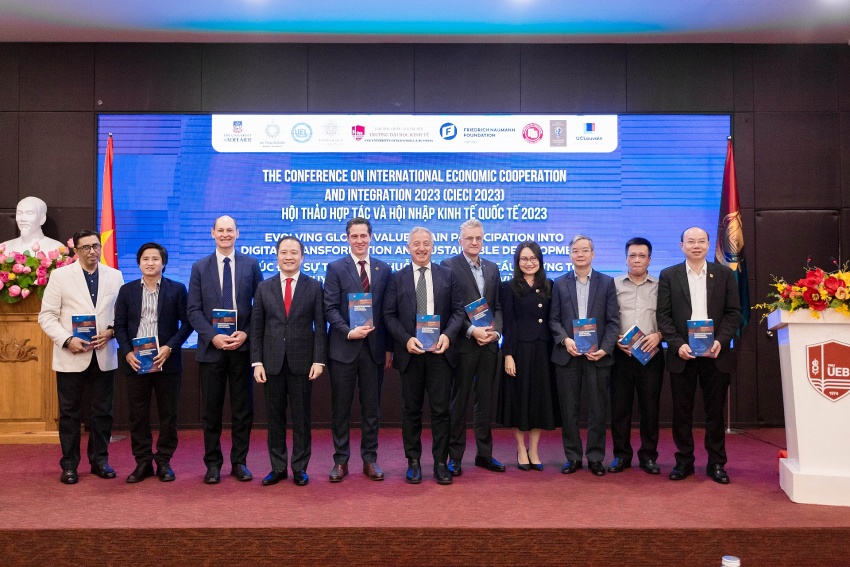 |
On November 24, the 11th Conference on International Economic Cooperation and Integration (CIECO 2023) took place at the Vietnam National University – Hanoi University of Economics and Business with the participants of leaders of universities in Vietnam and in the region, international organisations, and economists of various ministries and agencies.
The theme of the CIECO 2023 is “Evolving global value chain participation into digital transformation and sustainable development.”
At the conference, Professor Shandre M. Thangavelu, president of the Jeffrey Cheah Institute for Southeast Asia, said that in the past decade, East Asia and South Asia have faced rising protectionism and anti-globalisation in regional and global trade, impacting growth and development in the region.
The pandemic, US–China trade war tensions, the Russia–Ukraine, global inflationary pressures, global value chain (GVC) disruptions, and the expected global and regional recession in 2023 are expected to have significant impacts on the development of the region.
“With rising global uncertainties and GVC disruptions, we will experience more inward-looking policies, a rise in protectionism, and fragmentation of global and regional trading arrangements,” he said.
In 2022, the US introduced the Chips and Science Act that sought to limit Chinese participation in complex international semiconductor chip trade and production networks.
Thangavelu also highlighted rising protectionism. Trading areas and arrangements are also under significant pressure to manage key domestic and regional issues beyond the traditional trade issues related to the movement of goods, services, and capital.
The gains from trade are unevenly distributed and biased against the unskilled. Firms that are less-skilled and labour-intensive, such as the garments and textiles, and agricultural sectors, tend to experience less gains from trade in terms of wage increases, according to United Nations Conference on Trade and Development.
As trade increases growth in more open economies, these countries are also concurrently experiencing widening wage gap (between the skilled and unskilled) and also the polarisation of semi-skilled jobs.
In recent years, ASEAN member countries experienced a large decline in the share of semi-skilled jobs (mostly white-collar jobs) as compared to unskilled and skilled jobs in Australia, India, Indonesia, South Korea, New Zealand, Malaysia, the Philippines, and Thailand.
“Larger companies have better access to regional and global markets than smaller companies, and the rising state level trade interventions recently has also affected their investment in markets and technologies overseas,” Thangavelu said.
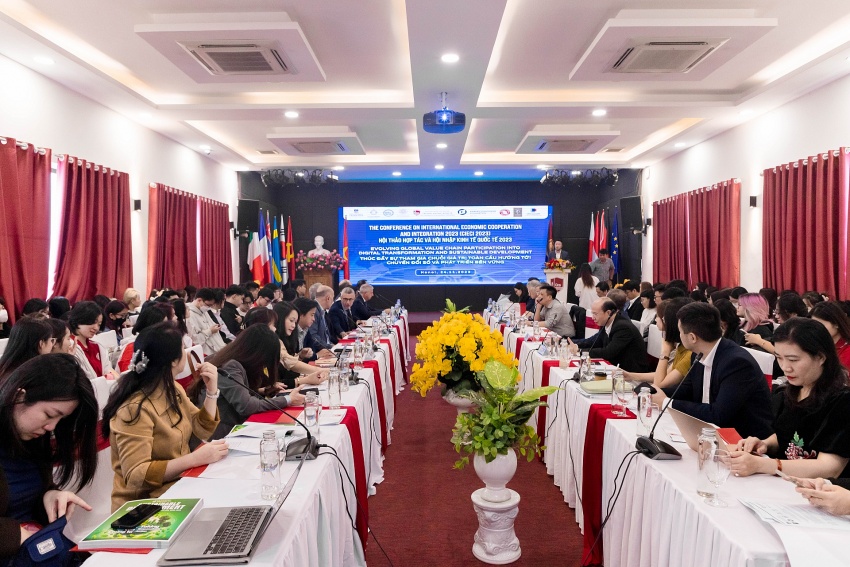 |
The above issues require an alignment of the global, regional, and domestic policies and structural issues, he added. It also requires coordination within and between countries and among different trading arrangements to reduce overlapping of policies, high transaction costs in border trade, and the fragmentation of the global and regional trading framework.
He highlighted the importance of free trade agreements for growth. The balancing of the gains of trade with inclusive growth will be the key policy challenge for East Asia as the intensity of the anti-trade populism increases in East Asia.
“The importance of regional cooperation under ASEAN and APEC and also multilateral trade arrangements such the Regional Comprehensive Economic Partnership (RCEP) in balancing sustainable and inclusive growth from trade will be fundamental to manage the impact of globalisation in the region,” Thangavelu said. “Free trade agreements are important. However, we need the alignment of regional and domestic policies for the full benefit of trade and investment. The RCEP underpins the largest trading region and is crucial and important turning point for global trade."
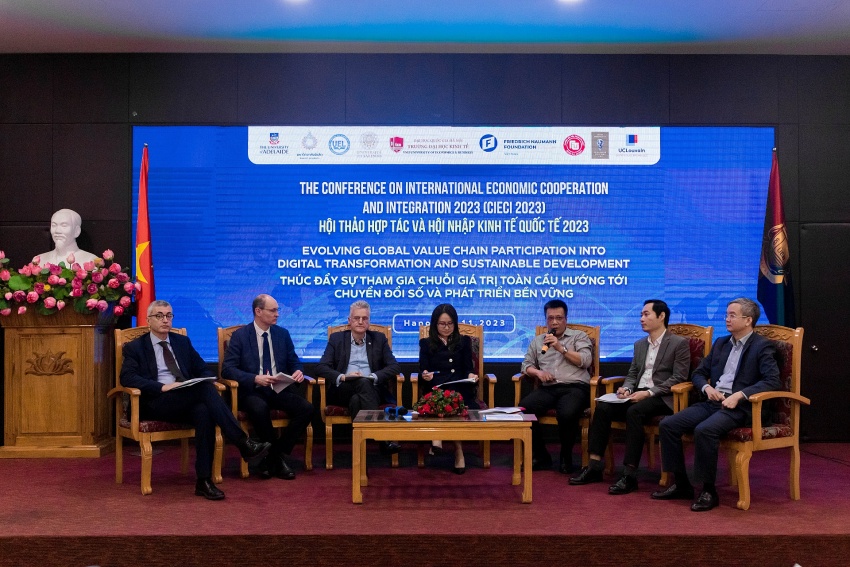 |
At the CIECI 2023, Fabio Pollice, president of Salento University in Lecce, Italy, said, “Innovation spreads along the global value chain and moves from the centre with the highest strategic content, where innovation usually originates, towards the most external and sometimes marginal areas.”
“Innovation spreads within university networks, and from the local nodes of these networks it spreads to their respective territorial contexts. In this way, the innovation of public and private actors operating in the territory is promoted and the territory is made more attractive for external investors and global value networks,” he said.
Economists provided evaluation on fluctuations in the world economy at the conference, such as the energy crisis, political tensions, and new trends such as digital transformation and sustainable development, and how they affect the development and reshaping of GVCs.
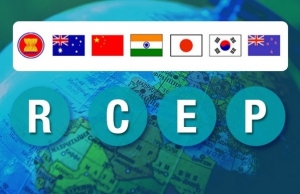 | Long-term gains on horizon for Vietnam via RCEP The application of favourable conditions for rules of origin within the Regional Comprehensive Economic Partnership is expected to benefit Vietnam’s trade performance and enable the country to participate more deeply in the regional supply chain. |
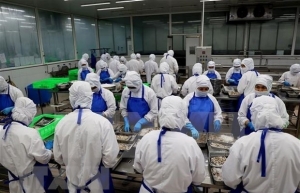 | RCEP creates new impetus for regional economic development Since it entered into force in early 2022, the Regional Comprehensive Economic Partnership (RCEP) has helped strongly promote integration of value and supply chains, strengthen confidence in regional economic recovery and create new impetus for trade and investment growth in the region and the world, according to an article on the Zhongguopinglun (China review) website of Hong Kong (China). |
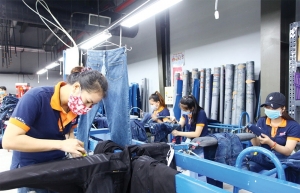 | RCEP effectiveness measures to benefit Vietnam A new drive is underway to ensure the Regional Comprehensive Economic Partnership is implemented at the optimal level. |
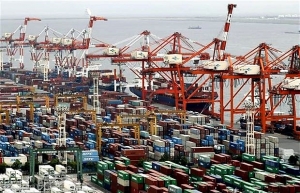 | ASEAN wants to expand RCEP membership ASEAN Secretary-General Kao Kim Hourn has said the Association of Southeast Asian Nations (ASEAN) is striving to increase the membership of the Regional Comprehensive Economic Partnership (RCEP). |
What the stars mean:
★ Poor ★ ★ Promising ★★★ Good ★★★★ Very good ★★★★★ Exceptional
Related Contents
Latest News
More News
- NAB Innovation Centre underscores Vietnam’s appeal for tech investment (January 30, 2026 | 11:16)
- Vietnam moves towards market-based fuel management with E10 rollout (January 30, 2026 | 11:10)
- Vietnam startup funding enters a period of capital reset (January 30, 2026 | 11:06)
- Vietnam strengthens public debt management with World Bank and IMF (January 30, 2026 | 11:00)
- PM inspects APEC 2027 project progress in An Giang province (January 29, 2026 | 09:00)
- Vietnam among the world’s top 15 trading nations (January 28, 2026 | 17:12)
- Vietnam accelerates preparations for arbitration centre linked to new financial hub (January 28, 2026 | 17:09)
- Vietnam's IPO market on recovery trajectory (January 28, 2026 | 17:04)
- Digital economy takes centre stage in Vietnam’s new growth model (January 28, 2026 | 11:43)
- EU Council president to visit Vietnam amid partnership upgrade (January 28, 2026 | 11:00)

 Tag:
Tag:


























 Mobile Version
Mobile Version